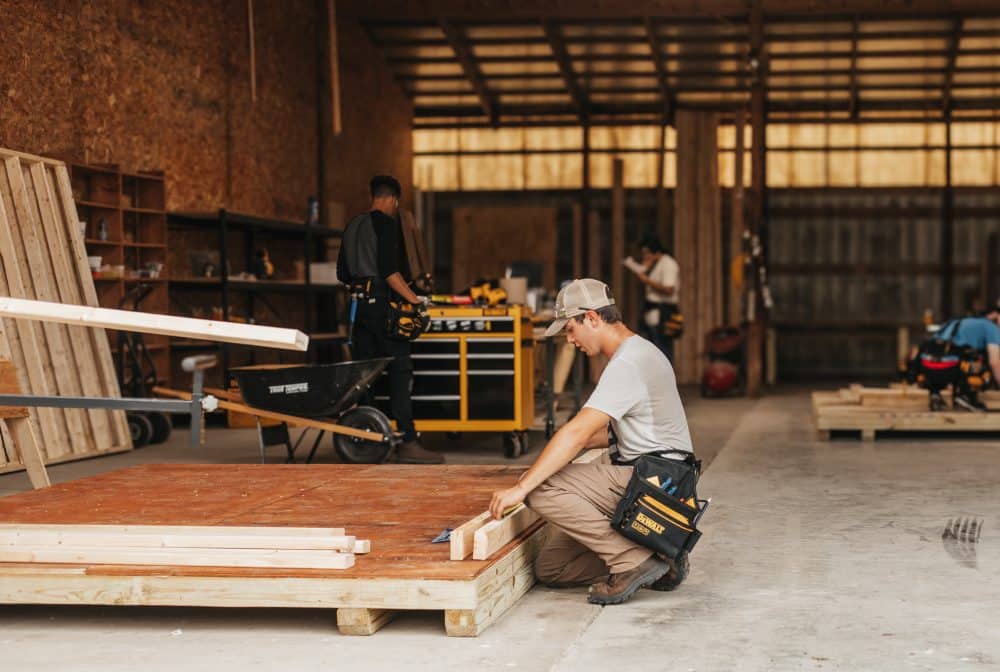
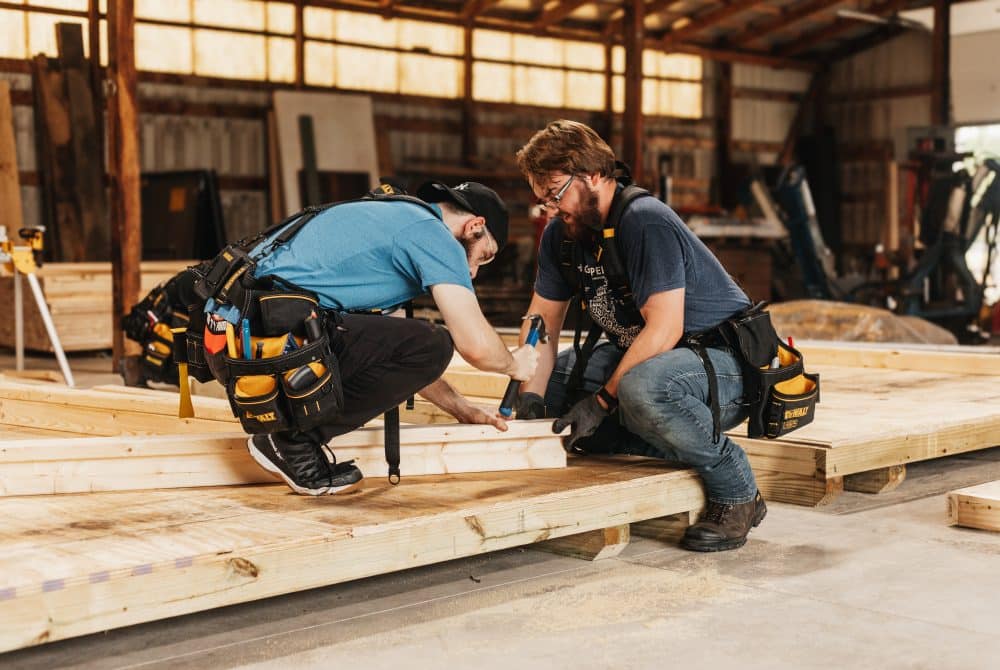
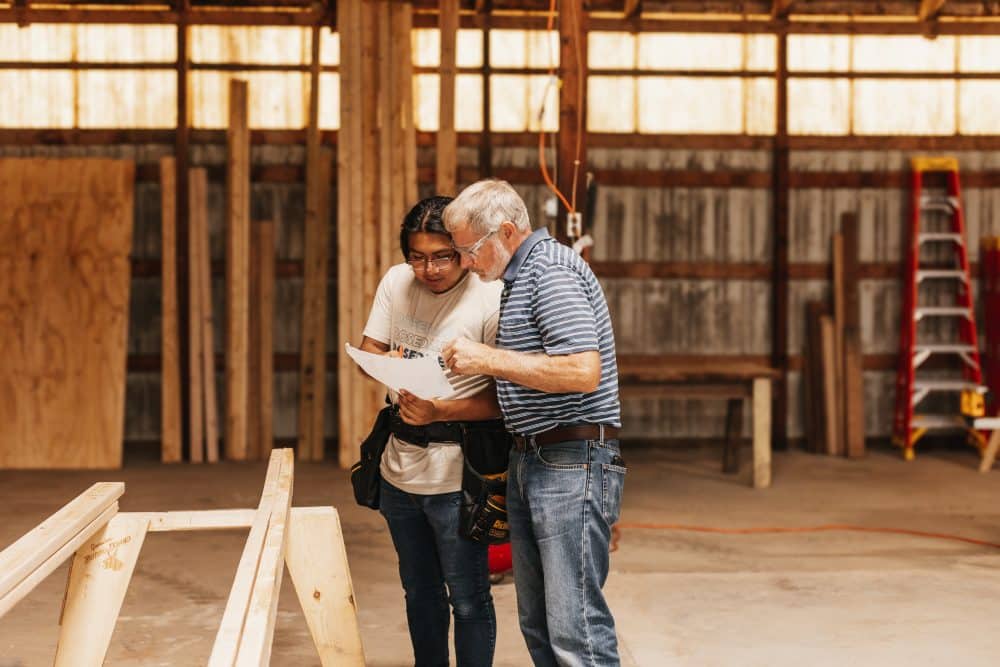
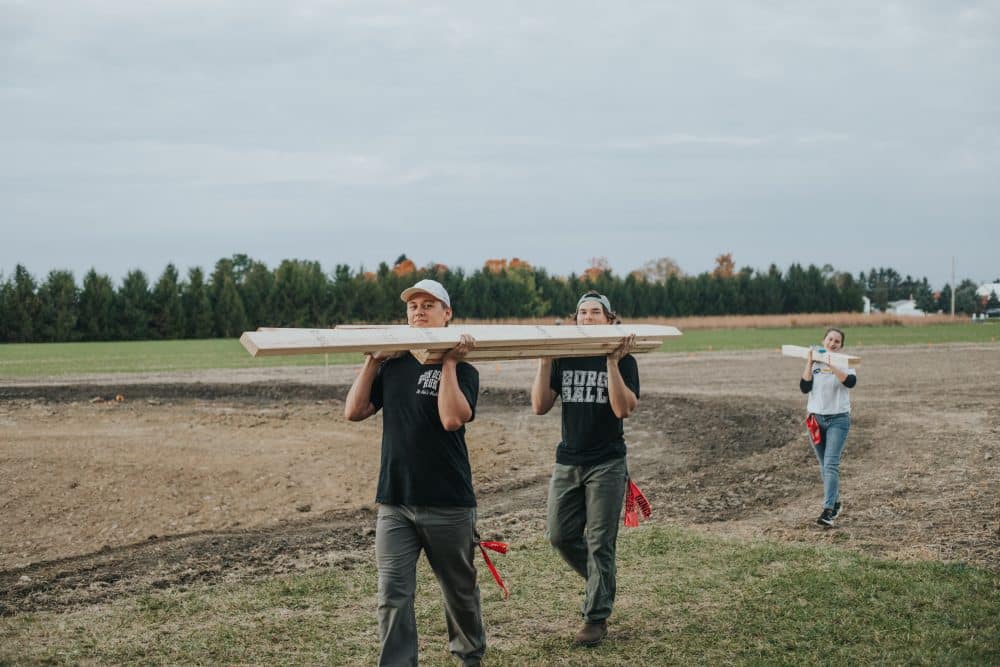
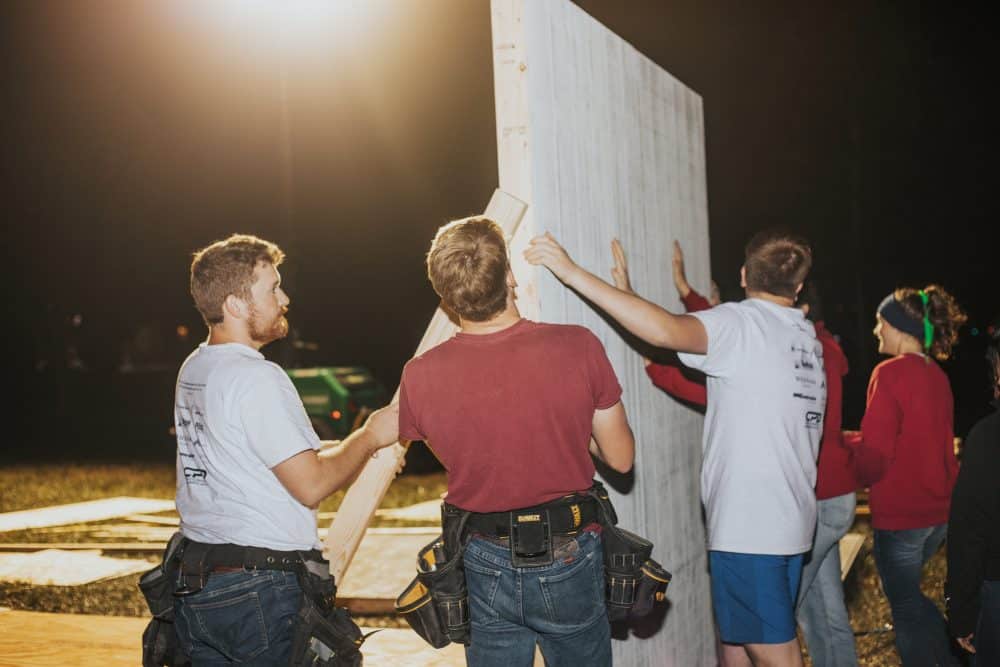
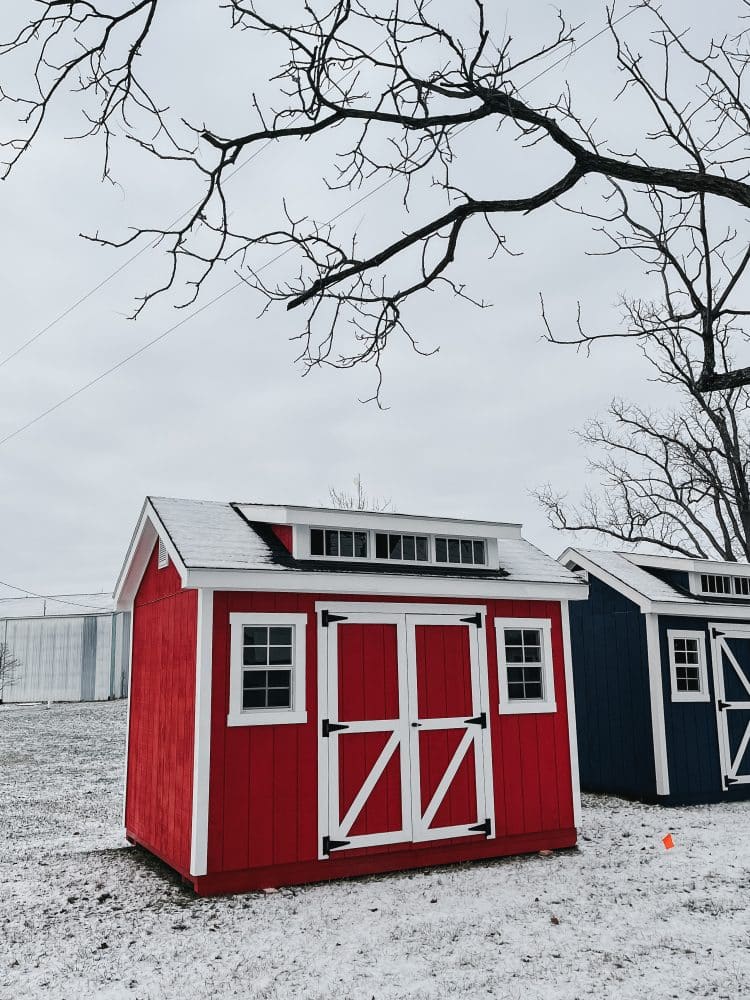
A glimpse into what high school and college programs can offer shed builders—and what builders can offer back.
You’ve probably heard about, or encountered, the lack of skilled workers in the U.S. labor market.
That includes fewer workers skilled in carpentry and construction necessary to build sheds and other portable structures.
There is one solution that might help builders find new employees—trade programs at local schools.
Shed Business Journal spent some time with Jeremy Miller, president of Rosedale Bible College in Irwin, Ohio, and Titus Beitzel, director of its trade program, to discuss its program, what programs can offer shed builders, and what builders can offer in return.
In general, what is the purpose of a trade program? What does it provide?
MILLER: As we envision it for us, it acclimates young people who are interested and/or curious about a career in trades, it acclimates them to major concepts in the building trades. We’re involved primarily in the building trades, so, ultimately, they’re helping build a small house, and they’ll become familiar with the central principles of how a house comes together with plumbing, electrical, the framing, the carpentry, trusses, finished work.
It’s to give them an overview of what that involves and get them familiar with tools and the process, as well as the equipment, needed to do something like that. It’s kind of an entry-level program that allows students to understand where they might fit best into the trade world.
What skills would trade programs provide for potential workers for shed builders?
BEITZEL: When we were looking at the program, we were looking at introduction to carpentry, electrical, plumbing, and mechanical, HVAC, and that type of thing.
The first semester that we did that, in the fall we were concentrating on carpentry, and when we were looking at that we wanted to give the students some real-world experience, not just book learning, that type of thing. Our goal was to get them in the shop about 75 percent of the time and do our book stuff about 25 percent of the time, so we took on sheds as our carpentry portion of this.
We had students who came in who had hardly run a drill or maybe not even a saw before. And then we had some of our students who, when I got to laying out some stairs, they were like, I’ve done this before. I’ll show the others. We had a large variety. What it did is it allowed us to break our students up into groups of three students per shed. Each group built its own shed. We did the floor foundation, and we did the walls. We did the siding. We did the trusses, and it gave them real experience in doing that. It wasn’t just theory and there’s 12 of us and only two of us get to do something. All of them had to take part.
We also did an event later where we call it a deadline weekend where we wanted to simulate for construction people, they had to get something finished. And so, from 6 o’clock Friday night to 11 Saturday morning, they were broken up into teams and brought additional students from the rest of campus to join their teams, and they built a shed overnight. Not only did they have to build it overnight, they had to transport all the material from our trades location on the main campus about a quarter-mile away while going across the obstacle courses. It was an all-night event where they were dead tired by the end of it, but we got four more sheds up. I’m not going say complete. We got them up and under roof that night.
We were using that as getting real experience for our students with swinging hammers, and 50 percent of the nails went in had to use guns and 50 percent had to be hand-driven. It really turned into us being able to figure out where the students were and then work with them on learning their skills instead of them just sort of faking it. You could tell quickly if they do after they actually start working, whether they know what they’re doing.
Since you were working on sheds, what were some of the more challenging lessons you had to teach them, or they had difficulty grasping?
BEITZEL: When we worked on, say, 16-inch centers, they could grasp that you take a piece of plywood, you divide it up evenly at 16 inches. When the end of the plywood comes, that last stud had to be offset three-quarters of an inch so that you can splice two pieces on there. I explained it to them on the chalkboard, but it didn’t really make sense to them until they actually ended up, “Oh, I can’t nail another one on here.” And so they may remember those concepts that we sort of take for granted since we’ve grown up in that and we know them. It became real for them.
Some of the other things that I remember were just the ability for them to troubleshoot when they get into a tough situation. Like, they may have a 2 by 4 that’s all warped, and on paper it looks really good. But when you put it in there, it’s like no you don’t just go ahead and do something, you have to make sure that the 2 by 4 is straightened out before you finish nail it.
They got that real experience of being able to troubleshoot as we went along and solve those problems because real world isn’t like it is on paper. That was one of the things that I think stuck out to them. I heard more comments from the students about, “You mean we actually have to think while we’re doing this and not just hammer stuff in?”
Tell us a little bit more about your program. How did it get started? What is its purpose?
MILLER: Rosedale Bible College is a two-year college, whose primary interest is in developing the faith of young people. But what we noticed is a lot of young people are interested in the trades. We kept asking, how can we help serve them, because our mission goes beyond just collegiate education. We’re interested in developing the faith of young people, which would include people in the trades.
Through a bunch of really neat circumstances, it’s kind of a long story, but we were able to acquire some land and buildings. Titus came along at just the right time. He’s been involved in the trades all his life, and he’s kind of an entrepreneur and loves starting things. And then we had a lot of interest from trades folks in helping with resourcing this thing. We would credit God with just moving ahead of us and allowing this thing to take shape.
It’s just a really neat situation that has done exactly what we’d hoped in that these trade school students are part of the trades program half of the time, and they’re taking our faith formation classes the other half of the time. It’s just a superb mixture, and they’re part of the campus community. They’re full-time students, and they’re getting the campus life. They’re going to chapel. They’re just a part of campus, and it’s just really neat.
BEITZEL: Another aspect of this that helped the program along is there’s an organization called Mennonite Disaster Service that does disaster relief work. Often, they’ll go into any place where FEMA goes in, and then Mennonite Disaster Service stays long-term after. They’re building houses and that type of thing.
Aug 2024 Oct 2024 Dec 2024 Feb 2025 Hired/hiring more people 23% 18% 17% 16% No change 61% 66% 68% 77% Reduced/reducing our workforce 16% 16% 14% 8%
Mennonite Disaster Service, when they heard what we were looking at, they approached us and asked if we would consider partnering with them where they would give a scholarship for each first-year student to attend. As part of that, the students then go work with them for six weeks during the winter term at their disaster site. So, as the students are finishing their last week this week, there are students in Texas, Florida, California, Arkansas, actually working on site.
I’ve had a text chat with those students going this whole time, and they’re sending me pictures of what all they’re doing. It’s really neat that the whole faith aspect is really important to these students as well, because they’re constantly texting each other and saying, “Hey, we’re with this family, and we have this situation, pray for this.” Even on a personal level, “Hey, I’m struggling with this personally, could you guys pray for me during this time?” These students are participating not just to get the hands-on trades experience, they’re looking at this as getting a firm foundation for their Biblical studies, as well, but knowing they’re probably going to go into the trades.
They’re like me when I attended Bible college. I had no intention of going on and studying anything else. It was like, nope, I’m going into the trades. That’s what I did for my entire life, and it was extremely fulfilling to me. And I was glad I never stepped foot in another college and went and did what I was called to do.
I feel there are a lot of other students who are that way. They’re not called to go to college, and we’re looking to help them with that.
MILLER: I think that partnership with Mennonite Disaster Service can’t be overstated in the value of it. One thing we’re hoping is that they also catch a vision for not just using the trades to sort of build a life for themselves but also understanding that is a gift to be shared with people who may be less fortunate and experiencing very difficult times in life.
That’s just been an incredible blessing to see. They have the opportunity to participate in that and learn that way of thinking now. So I see that as a real gift.
Are any of your students in Western North Carolina helping out because of the hurricane?
MILLER: Not this year. It’s likely they will be in the future, because one of the things that Mennonite Disaster Service does, they actually have a whole bunch of Amish working down there right now, but they tend to come in after the initial cleanup has happened and then they start helping people rebuild for the long term.
BEITZEL: The students in Texas, they’re still working from a hurricane a year or so ago. They were actually building houses during the six weeks.
How would a shed builder go about tracking down the local trades program so they could look into maybe hiring some of those students or taking some of those students on to further their education?
BEITZEL: I reached out to a local shed builder in Ohio, and they’ve given us some hints and tips and things like that. I’m inviting that shed builder to speak to our class this coming semester to tell them what all they do. That way they can introduce themselves to the students as far as looking for employees, that type of thing.
I think if any shed builder is interested or looking for somebody, if they find a technical school or if they find even a high school. Often, a high school is a good one. Where I’m coming from is that I was part of a large corporation, a construction company. We were up to about 500 people when I retired. One of the things that we did as an organization to find employees was, we started going to all the high schools that we were working in, and most of the high schools will have some type of a trades or vocational type of program. We would go there and present to them. We were really surprised at how much better a result we got of finding employees when we went to the high school level than even when we went to some of the trades programs because some of the tradespeople already have in their heads, “Okay, this is what I’m doing.” The high school people are very fluid about, “That looks really interesting to me.” That helps them during those next two or three years develop, “I’d like to work for this corporation, or somebody like it,” because we introduced to them what they could be. Also, they look at us as sort of the experts in that and it got them thinking about that. So, just reaching out to any trades program is a good idea if somebody’s looking for employees.
The other part of that, I would say is when you reach out to a trades program, try to get direct conversation with the instructors because they will give you good feedback, or they’ll know who has the ambition and the attitude. That’s what you’re really looking for is people who have ambition and attitude. The ability, we’ll figure that out later, but they’ll know who the guys are that they’re a good team member.
How about the other way around? How can shed builders reach out and help a trades program?
BEITZEL: When I was looking for something for carpentry to do that was not going to cost us money, we were looking for something that might generate us some funds. Because if the labor’s free, the students are building the sheds, if a shed company were to come in and say, “Hey, we will put materials there for you. We will give you drawings of how to build the sheds to what we do.” And then they would even market those sheds for the trades program to where at least that builder comes out at cost on that.
All of a sudden, it helps the school because the school does not have a lot of funds that they’re putting into this. We’re getting the training here. The shed builder, maybe, will make some profit. Maybe they’re going to share that with the school, as well, depending on what that looks like. But the most important thing is that the students there are starting to interface directly with the shed builder, and they’re feeling comfortable with shed builders, maybe that’s where they’d like to work.
At first, I felt like the shed builder could view a school as competition, but if I’m building eight sheds during a year as a school, I don’t think I’m much competition. I think the advantages of getting access to those students and figuring out which ones would be the ones I maybe want to hire far outweigh the competition, in my opinion.
MILLER: I think sheds are such an incredible entry-level project into more complex buildings, like building a home, because you learn basic, important things that matter.
BEITZEL: We’re getting ready to go into building, I try not to use the word tiny house. It’s more of a cottage on wheels that’s our next project because that’ll get the electrical. If I wouldn’t have had the first semester of building these sheds, I’d be really nervous about moving into this next project. Now, I’m going forward with confidence. Probably in my mind and the other volunteer, it’s more confidence in that we know which students we can put on the really critical tasks. We know which students we need to be working with side-by-side to help them understand and put together a quality product.
With a shed, there’s a little bit more forgiveness. But at the same time, now that we walked through this year, it’s like, we could have done this so much better as even leaders on the next round because we know what to look for and sort of our put out our “stop” gates. Before you move ahead, you have to stop and get one of us to approve this before moving to the next stage.
Any final thoughts about trades programs and shed builders working together? Anything that you consider important for the readers to know?
BEITZEL: From my perspective, something that would help us from a trades program and also maybe to introduce more students to the shed-building side of things would be if there was a shed company that actually partnered with us to bring some supplies or that type of thing.
Anywhere from what are common supplies used, what are common techniques used that we can teach our students. Also, helping with the marketing aspects, so they can be done properly and also the transportation side of things. Those are sort of things we have figured out on our own or we’re still trying to figure out on our own.
If there was a company that came and knocked on our door and said, “You’re doing trades program? We want to be involved to help with this.” I think that company could do that at, essentially, no cost to them. They may not make a profit from it, but no cost because the materials would be subsidized whenever the shed is sold and that type of thing. The money would come because the labor is essentially free.
That would have been a big help to us, and the benefit to the builder would have been an introduction to those students and be able to speak with them and that type of thing.
An example that I have of that is there was a robotics program that our high schools were involved in, a lot of high schools across the nation are involved in robotics programs, and that robotics program requires an industry company to be sponsoring them. Not only sponsoring them but for mentors to be working on the team with them because that gets those students engaged into that company and that mentorship.
I was involved in that and that would be a model I could see working with a shed builder for a trades program.
MILLER: To me it seems like, at least in the carpentry world of vocational training, it feels like a very wise thing for shed builders, and it’s an easy access point for shed builders to partner with a trade school, as Titus said, for no cost, really, outside of time invested in that. It feels like that could pay real dividends to shed builders.



